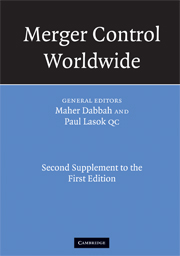Book contents
- Frontmatter
- Contents
- List of contributors
- Table of cases
- Table of legislation
- Introduction to the Second Supplement
- Introduction to the First Supplement
- 1 Argentina
- 2 Armenia
- 3 Australia
- 4 Austria
- 5 Belgium
- 6 Brazil
- 7 Canada
- 8 Chile
- 9 China
- 10 Denmark
- 11 European Union
- 12 Germany
- 13 Greece
- 14 Iceland
- 15 Italy
- 16 Japan
- 17 Republic of Korea
- 18 Malta
- 19 Mexico
- 20 The Netherlands
- 21 New Zealand
- 22 Norway
- 23 Singapore
- 24 Spain
- 25 Switzerland
- 26 Taiwan
- 27 Ukraine
- 28 United Kingdom
- 29 United States of America
- Index
20 - The Netherlands
Published online by Cambridge University Press: 30 July 2009
- Frontmatter
- Contents
- List of contributors
- Table of cases
- Table of legislation
- Introduction to the Second Supplement
- Introduction to the First Supplement
- 1 Argentina
- 2 Armenia
- 3 Australia
- 4 Austria
- 5 Belgium
- 6 Brazil
- 7 Canada
- 8 Chile
- 9 China
- 10 Denmark
- 11 European Union
- 12 Germany
- 13 Greece
- 14 Iceland
- 15 Italy
- 16 Japan
- 17 Republic of Korea
- 18 Malta
- 19 Mexico
- 20 The Netherlands
- 21 New Zealand
- 22 Norway
- 23 Singapore
- 24 Spain
- 25 Switzerland
- 26 Taiwan
- 27 Ukraine
- 28 United Kingdom
- 29 United States of America
- Index
Summary
Relevant legislation
On 1 October 2007, a revised Dutch Competition Act (the “revised Act”) entered into force. The revised Act provides for the following changes with regard to merger control in the Netherlands:
Substantive test: The “dominance” test for concentrations has been altered to follow the reworded “significant impediment of competition” assessment in European Community (EC) Regulation No. 139/2004. The Dutch Competition Authority, NMa, will focus on the economic reality of each case and efficiencies will be considered.
Joint ventures: Under the revised Act all full-function joint ventures are dealt with under the merger control provisions. Before the entry into force of the revised Act, full-function “co-operative” joint ventures were not considered under merger control rules but rather under the cartel rules, a practice that was in line with the EC merger control rules as they applied until March 1998.
Remedies: The revised Act provides the NMa with the power to grant conditional clearance (i.e. with remedies) in phase I decisions, in line with EC Regulation No. 139/2004. Prior to the revised Act, it was not possible for the NMa formally to impose conditions in relation to a phase I clearance decision. Merging parties in practice worked round this by restructuring their transaction following pre-notification discussions or during phase I.
Related transactions: The revised Act expressly provides the NMa with the authority to assess legally or economically related transactions as part of the same concentration; this was already the case in practice. […]
- Type
- Chapter
- Information
- Merger Control WorldwideSecond Supplement to the First Edition, pp. 104 - 108Publisher: Cambridge University PressPrint publication year: 2008



